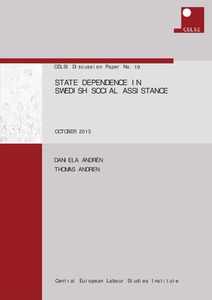State dependence in Swedish social assistance
"<span style="font-size: 11px;">This study estimates the state dependence in social assistance in Sweden during 1990-1999 by different types of households, which were grouped by the country of birth of the sampled individual and his/her partner. The results show that the structu...
| Main Authors: | , |
|---|---|
| Institution: | ETUI-European Trade Union Institute |
| Format: | TEXT |
| Language: | English |
| Published: |
Bratislava
2013
CELSI |
| Subjects: | |
| Online Access: | https://www.labourline.org/KENTIKA-19122519124919407919-State-dependence-in-Swedish-so.htm |
| _version_ | 1771659898746044416 |
|---|---|
| author | Andrén, Daniela Andrén, Thomas |
| author_facet | Andrén, Daniela Andrén, Thomas |
| collection | Library items |
| description | "<span style="font-size: 11px;">This study estimates the state dependence in social assistance in Sweden during 1990-1999 by different types of households, which were grouped by the country of birth of the sampled individual and his/her partner. The results show that the structural state dependence differed extensively across different household types. Although Swedish-born partners who separated are one of the groups with the lowest receipt of social assistance (i.e., 1.08-1.76%), these individuals exhibit the highest state dependence (24.4 percentage points). Foreign-born singles have almost the same value for the state dependence, but these individuals also have the highest receipt of social assistance (18.47%). Surprisingly, the group with the lowest receipt of social assistance (0.27-3.06%) and the lowest state dependence (4.7 percentage points) are the foreign-born women living together with a Swedish-born man. However, for the mixed samples, there are only few parameters for the country of origin that are statistically significant. For example, compared to the Nordic-born group, men born in Eastern Europe who lived with a Swedish-born woman during 1990-99 have a lower propensity (1 percentage points) to receive social assistance, whereas men born in the Middle East or the rest of the world who lived with a Swedish born woman in 1990 have a higher propensity (1.1-1.2 percentage points)."</span> |
| format | TEXT |
| geographic | Sweden |
| id | 19122519124919407919_f722390d15b24522aafde8467b9741a1 |
| institution | ETUI-European Trade Union Institute |
| is_hierarchy_id | 19122519124919407919_f722390d15b24522aafde8467b9741a1 |
| is_hierarchy_title | State dependence in Swedish social assistance |
| language | English |
| physical | 29 p. Digital |
| publishDate | 2013 |
| publisher | Bratislava CELSI |
| spellingShingle | Andrén, Daniela Andrén, Thomas dependence social assistance welfare state State dependence in Swedish social assistance |
| thumbnail | https://www.labourline.org/Image_prev.jpg?Archive=100927992810 |
| title | State dependence in Swedish social assistance |
| topic | dependence social assistance welfare state |
| url | https://www.labourline.org/KENTIKA-19122519124919407919-State-dependence-in-Swedish-so.htm |

